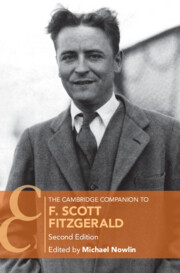49 results
Contributors
-
- Book:
- The Cambridge Companion to F. Scott Fitzgerald
- Published online:
- 26 October 2023
- Print publication:
- 09 November 2023, pp xvi-xviii
-
- Chapter
- Export citation
Contents
-
- Book:
- The Cambridge Companion to F. Scott Fitzgerald
- Published online:
- 26 October 2023
- Print publication:
- 09 November 2023, pp xiii-xiv
-
- Chapter
- Export citation
Chapter 9 - Great Art, Small Art, and Modernist Cachet
-
-
- Book:
- The Cambridge Companion to F. Scott Fitzgerald
- Published online:
- 26 October 2023
- Print publication:
- 09 November 2023, pp 203-222
-
- Chapter
- Export citation
Figures
-
- Book:
- The Cambridge Companion to F. Scott Fitzgerald
- Published online:
- 26 October 2023
- Print publication:
- 09 November 2023, pp xv-xv
-
- Chapter
- Export citation
Dedication
-
- Book:
- The Cambridge Companion to F. Scott Fitzgerald
- Published online:
- 26 October 2023
- Print publication:
- 09 November 2023, pp xi-xii
-
- Chapter
- Export citation
Introduction
-
-
- Book:
- The Cambridge Companion to F. Scott Fitzgerald
- Published online:
- 26 October 2023
- Print publication:
- 09 November 2023, pp 1-14
-
- Chapter
- Export citation
Chronology
-
- Book:
- The Cambridge Companion to F. Scott Fitzgerald
- Published online:
- 26 October 2023
- Print publication:
- 09 November 2023, pp xix-xxiii
-
- Chapter
- Export citation
Abbreviations
-
- Book:
- The Cambridge Companion to F. Scott Fitzgerald
- Published online:
- 26 October 2023
- Print publication:
- 09 November 2023, pp xxiv-xxvi
-
- Chapter
- Export citation
Select Bibliography
-
- Book:
- The Cambridge Companion to F. Scott Fitzgerald
- Published online:
- 26 October 2023
- Print publication:
- 09 November 2023, pp 258-263
-
- Chapter
- Export citation
Copyright page
-
- Book:
- The Cambridge Companion to F. Scott Fitzgerald
- Published online:
- 26 October 2023
- Print publication:
- 09 November 2023, pp x-x
-
- Chapter
- Export citation
Index
-
- Book:
- The Cambridge Companion to F. Scott Fitzgerald
- Published online:
- 26 October 2023
- Print publication:
- 09 November 2023, pp 264-272
-
- Chapter
- Export citation

The Cambridge Companion to F. Scott Fitzgerald
-
- Published online:
- 26 October 2023
- Print publication:
- 09 November 2023
Chapter 26 - Wright and Les Temps Modernes
- from Part III - Literary and Intellectual Contexts
-
-
- Book:
- Richard Wright in Context
- Published online:
- 08 July 2021
- Print publication:
- 22 July 2021, pp 273-282
-
- Chapter
- Export citation
Abbreviations
-
- Book:
- Richard Wright in Context
- Published online:
- 08 July 2021
- Print publication:
- 22 July 2021, pp xviii-xviii
-
- Chapter
- Export citation
Part IV - Reputation and Critical Reception
-
- Book:
- Richard Wright in Context
- Published online:
- 08 July 2021
- Print publication:
- 22 July 2021, pp 305-357
-
- Chapter
- Export citation
Part III - Literary and Intellectual Contexts
-
- Book:
- Richard Wright in Context
- Published online:
- 08 July 2021
- Print publication:
- 22 July 2021, pp 183-304
-
- Chapter
- Export citation
Introduction - Richard Wright’s Luck
-
-
- Book:
- Richard Wright in Context
- Published online:
- 08 July 2021
- Print publication:
- 22 July 2021, pp 1-8
-
- Chapter
- Export citation
Contents
-
- Book:
- Richard Wright in Context
- Published online:
- 08 July 2021
- Print publication:
- 22 July 2021, pp v-vii
-
- Chapter
- Export citation
Part II - Social and Cultural Contexts
-
- Book:
- Richard Wright in Context
- Published online:
- 08 July 2021
- Print publication:
- 22 July 2021, pp 65-182
-
- Chapter
- Export citation
Copyright page
-
- Book:
- Richard Wright in Context
- Published online:
- 08 July 2021
- Print publication:
- 22 July 2021, pp iv-iv
-
- Chapter
- Export citation



